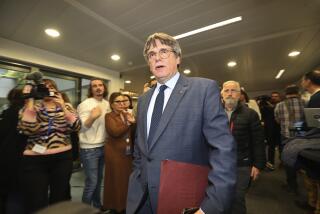Basque Separatist Group Ends Four-Decade War With Spain
- Share via
MADRID — The Basque separatist group ETA declared a “permanent” cease-fire Wednesday and pledged to step away from decades of violence, a major breakthrough that could end one of Europe’s last armed conflicts.
The announcement came at a time of military and political weakness for the militant organization that for nearly 40 years has fought for independence from Spain and claimed hundreds of lives in bombings and sabotage.
It follows a fierce crackdown under the previous Spanish government and a period of rumored negotiation, officially denied, with the current one. ETA has also seen its support fade amid public outrage over deadly bombings in Madrid two years ago by Islamic radicals.
“This is very good news for all Spaniards,” Vice President Maria Teresa Fernandez de la Vega said as reports of the truce swept the country. Urging “prudence,” she added, “We very much hope this is the beginning of the end.”
Reactions cleaved along political lines in this bitterly polarized country. The Socialist government of Prime Minister Jose Luis Rodriguez Zapatero responded with cautious elation, but the conservative opposition noted that the Basque group’s move fell short of surrender and claimed that it was nothing more than a ruse.
Ordinary Spaniards were full of tentative hope.
ETA declared the cease-fire, effective Friday, through a videotaped statement released about midday and broadcast on Basque and Spanish television. Unlike two previous cease-fires that collapsed after several months of negotiations, this declaration uses the term “permanent” and sets no conditions.
In the announcement, three members of the guerrilla group, wearing white masks and the black berets typical of the Basque Country, sat at a table with a cloth bearing the words Euskal Herria, or the Basque homeland, and the group’s coat of arms. Behind them hung a banner with the ETA insignia of a snake twisted around an ax. The statement was read, unusually, by a woman, who sat in the middle.
The group said its purpose was to “drive the democratic process” in the Basque Country that ensures “the development of all political options.”
“ETA has shown its desire and will that the process now begun should reach a conclusion and thus achieve true democracy in the Basque Country, overcoming long years of violence and constructing a peace based on justice,” the statement said.
A referendum in 1979 established the Basque Autonomous Community on the Bay of Biscay near the French border, comprising the provinces of Alava, Vizcaya and Guipuzcoa. It has its own police force, education and healthcare system.
Basques, who number about 2.2 million in Spain, are descendants of what may be one of the oldest ethnic groups in Europe. Polls indicate that about half favor a more independent state more loosely associated with Spain. Many who advocate statehood, however, do not support ETA’s violent ways.
ETA -- an acronym for Euskadi Ta Askatasuna, or Basque Homeland and Freedom in the Basque language -- declared cease-fires in 1989 and 1998, but negotiations that followed collapsed.
But this announcement may have a different outcome, analysts say, because of the arrest and imprisonment of senior ETA leaders, the capture of a major arsenal and the banning of its political wing. Polls have shown a widening weariness of violence in the Basque Country and growing rejection of bloodshed.
“There can never be a total guarantee, but what’s clear is that [the cease-fire] is a solid base for a peace process,” said Gorka Espiau Idoiaga, director of Elkarri, a Basque organization in the city of Bilbao that promotes dialogue. “They are showing a will to disappear and end the violence. It is extraordinary.”
Espiau, a senior fellow at the Washington-based U.S. Institute of Peace, noted that the wording of the communique released Wednesday emulated the language of the landmark 1994 statement by the Irish Republican Army.
In addition, it was the first time the Basque separatists had used the word “permanent” in a truce pledge.
ETA, a secretive organization that was founded during the dictatorship of Gen. Francisco Franco, has killed more than 800 people in attacks since 1968, including police officers, mayors and politicians. Hundreds more, among them journalists, justices and intellectuals, have been threatened.
The last ETA attack to cause a death was in May 2003, although more than 100 people have been injured in bombings since. The group had resorted to an intense campaign of blackmail and extorted a fortune from businessmen, bankers and even premier chefs who feared attacks on their property.
Any negotiations with ETA would include numerous difficult issues, such as the disarming of its cadres and the fate of its members held in Spanish prisons.
“Any peace process, after so many years of horror and terror, will be long and difficult,” Zapatero, the prime minister, said during a special session of parliament Wednesday afternoon.
He called for unity among all political parties and repeatedly used the words “calm,” “caution” and “prudence,” language aimed at deflecting critics who suggest he has been too soft on independence-minded factions.
Mariano Rajoy, leader of the main opposition Popular Party, attacked ETA’s declaration, noting that it did not renounce all criminal activity or ask for forgiveness from its many victims. Without such gestures, entering into talks with ETA would amount to rewarding terrorism, he said.
At parliament, lawmakers gathered around TV screens to watch the 1 p.m. broadcast of the ETA statement.
In San Sebastian, a major seaside Basque city and scene of much violence, the mayor and city hall officials toasted with the local version of champagne: “For peace and those who are absent.” National TV broke into regular programming to provide nonstop coverage, including recapitulations of the years of bloodshed. Gara, a Basque newspaper, published a special edition.
In Madrid, the word on seemingly everyone’s lips was Ojala -- “Let’s hope.”
Juan Jose Ibarretxe, the president of the Basque territory, called the ETA declaration historic.
“ETA has finally listened to Basque society, which demands an end to all criminal activity,” said Ibarretxe, a nationalist who advocates separation from Spain through peaceful means.
Families of ETA victims greeted the news with mixed emotion.
“I’ve got this knot in my stomach that tells me it might not be true, but my first thoughts are maybe, finally, there will be no more dead,” Barbara Durkhop, the widow of a Socialist official shot dead in 1984, told Spanish television.
The government that preceded Zapatero’s was especially harsh on the separatists. Former Prime Minister Jose Maria Aznar, who early in his career survived an ETA assassination attempt, sent police troops against ETA, outlawed politicians sympathetic to the group, closed its newspaper and deliberately dispersed its jailed members to prisons far from families and support groups.
Aznar maintained that a military crackdown alone would end nationalistic violence, and he succeeded in persuading the Bush administration to officially label ETA a terrorist organization.
With surveillance equipment provided by the CIA, as well as new cooperation with France, Aznar’s crackdown succeeded in crippling ETA.
*
(BEGIN TEXT OF INFOBOX)
Separatist struggle
Key events in the history of ETA:
* 1959 -- Is founded by dissident student members of the Basque Nationalist Party.
* 1961 -- Attempts to derail a train carrying supporters of dictator Gen. Francisco Franco.
* 1973 -- Kills Prime Minister Luis Carrero Blanco in a bombing in Madrid.
* 1987 -- Apologizes after car bomb in parking lot of a Barcelona store kills 21 and injures 45.
* 1989 -- Announces temporary cease-fire to help ultimately unsuccessful peace talks in Algeria.
* 1995 -- Attempts to kill conservative opposition leader and future Prime Minister Jose Maria Aznar with car bomb.
* 1997 -- Kidnaps small-town politician Miguel Angel Blanco and demands its imprisoned members be brought to Basque jails. His slaying triggers widespread demonstrations in Spain.
* 1998 -- Announces an open-ended cease-fire. It ends 14 months later after one round of talks with the Aznar government.
* 2003 -- Kills two police officers in Sanguesa in the northern region of Navarra, the group’s last deadly attack. Supreme Court outlaws radical Batasuna party linked to ETA.
* 2004 -- Police arrest more than 130 suspected ETA members, including alleged leader Mikel Antza, after Madrid train bombings kill 191 people. The attack is later attributed to Muslim radicals.
* 2005 -- Announces it will no longer kill elected members of political parties. Parliament backs Socialist Prime Minister Jose Luis Rodriguez Zapatero’s offer of talks with ETA if it renounces violence.
* March 22, 2006 -- Declares permanent cease-fire.
Source: Associated Press
More to Read
Sign up for Essential California
The most important California stories and recommendations in your inbox every morning.
You may occasionally receive promotional content from the Los Angeles Times.














